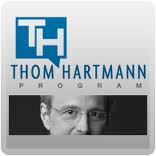 This should be the metric by which we determine what is public and what is private - public being government-run, we all own it collectively, and private being privately owned, it's owned by capitalists, essentially.
This should be the metric by which we determine what is public and what is private - public being government-run, we all own it collectively, and private being privately owned, it's owned by capitalists, essentially.
The things that are the collective commons - the air we all breathe, the water we all drink, things like that that - that stuff is clearly the function of government - protecting our air, our water, our roads, things like that.
But then there's a second category where there's a little more of a gray area, at least in the United States, at least by our definitions, and that is what are called natural monopolies. Natural monopolies are if you think of your home - how many power cables come into your house? Just one. How many water lines come into your house? Just one. How many septic lines leave your house? Just one. How many cable lines carrying the internet and cable television are coming into your house? Odds are it's just one.
So in each one of those cases those are places where the government should do one of two things: either they should regulate those things as if they were utilities so that the cost is low and the product is widely available, because it is on the edge of being the Commons - it's a natural monopoly so it is naturally anti-competitive and capitalism only works in a competitive environment. You don't have a competitive environment if you've only got one water line or one power line coming into your house. That's number one.
And number two, if the government doesn't regulate it to function as a utility, then the government should simply provide it.
So in the United States, for example, about half of all the electricity generated in this country is generated by state, county or municipally-owned power companies. The other half is generated by private for-profit power companies and we saw how badly that worked out when Enron took down the governor of California - Gray Davis - for political purposes with their rolling blackouts just to get a Republican, Arnold Schwarzenegger, in office. This is part of the corruption of the energy systems by Ken Lay who was running Enron at the time.
So it's more proof that we really need to be asking, what are the natural monopolies that should be heavily regulated and/or simply controlled or owned by government?
But on the other hand, private stuff, I don't want the government making my cars. I used to live in Germany, I remember the Trabbies, the cars that were made by the East German government, they were god-awful things. I don't want the government making my blue jeans. I don't want the government making my clothes or my computers or my TV or anything else that I'm just buying as a consumer.
Police and fire departments are clearly part of the public Commons. This was envisioned by the founders - police, fire, libraries, public roads, these are all things that we all collectively own, so they should be entirely the function of government.
And we really got religion around fire departments I believe after the Chicago Fire in 1871. It used to be in Chicago that you had your choice of different private fire companies and you would buy a medallion from them for a year which was your annual subscription and you would put that medallion on the front of your house. If your house caught on fire and the wrong fire company came by and saw it they would just keep on driving. And people's houses burned down and eventually a whole city burned down because it didn't work. So everybody got that this is an appropriate function of government.
Why We Can't Privatize Fire Fighters... Again
By Thom Hartmann A...



